Lexus ES VS Hyundai Inster – Specs, Efficiency & Price Comparison
Find out now which car fits your needs better!
The Lexus ES (Sedan) is powered by a Full Hybrid engine and comes with a Automatic transmission. In comparison, the Hyundai Inster (SUV) features a Electric engine and a Automatic gearbox.
When it comes to boot capacity, the Lexus ES offers 454 L, while the Hyundai Inster provides 280 L – depending on what matters most to you. If you’re looking for more power, you’ll need to decide whether the 218 HP of the Lexus ES or the 115 HP of the Hyundai Inster suits your needs better.
There are also differences in efficiency: 5.10 L vs 14.30 kWh. In terms of price, the Lexus ES starts at 46600 £, while the Hyundai Inster is available from 20500 £.
Compare all the key specs now and find out which model fits your lifestyle best!
Lexus ES
The Lexus ES represents a blend of luxury and comfort, offering a smooth driving experience that is characteristic of the brand. With its elegant design and meticulously crafted interior, it provides a serene environment for both driver and passengers. The inclusion of advanced safety features and cutting-edge technology enhances its appeal, ensuring that every journey is not only enjoyable but also secure.
details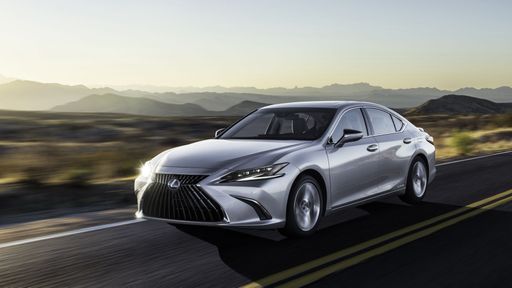 @ toyota-media.de
@ toyota-media.de
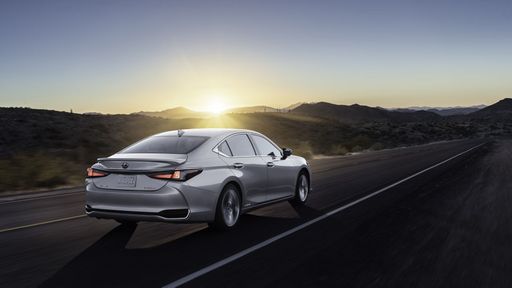 @ toyota-media.de
@ toyota-media.de
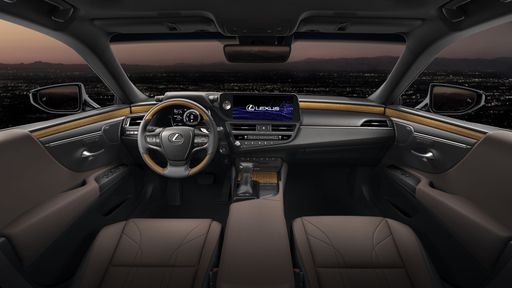 @ toyota-media.de
@ toyota-media.de
Hyundai Inster
The Inster has quickly captured the attention of automotive enthusiasts with its striking design and dynamic performance. This model seamlessly blends advanced technology with comfort, making it an ideal choice for both daily commutes and adventurous road trips. With its spacious interior and innovative features, the Inster promises an exhilarating driving experience that doesn’t compromise on practicality.
details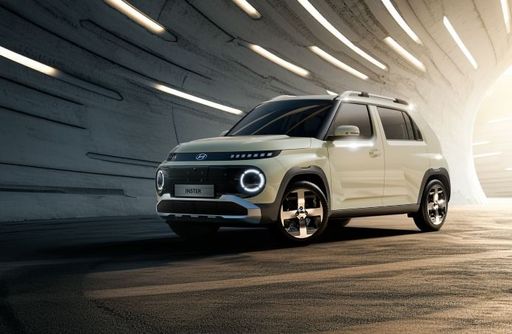 @ hyundai.news
@ hyundai.news
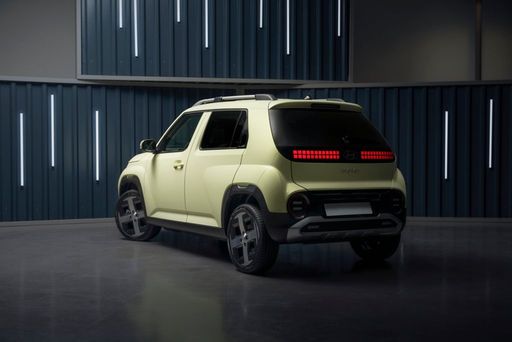 @ hyundai.news
@ hyundai.news
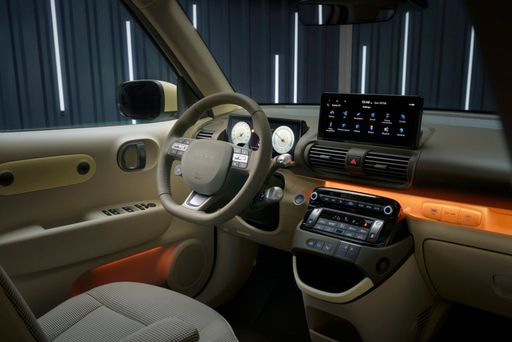 @ hyundai.news
@ hyundai.news

|

|
|
|
|
Costs and Consumption |
|
|---|---|
|
Price
46600 - 59300 £
|
Price
20500 - 25800 £
|
|
Consumption L/100km
5.10 L
|
Consumption L/100km
-
|
|
Consumption kWh/100km
-
|
Consumption kWh/100km
14.3 - 15.1 kWh
|
|
Electric Range
-
|
Electric Range
327 - 370 km
|
|
Battery Capacity
-
|
Battery Capacity
42 - 49 kWh
|
|
co2
115 g/km
|
co2
0 g/km
|
|
Fuel tank capacity
50 L
|
Fuel tank capacity
-
|
Dimensions and Body |
|
|---|---|
|
Body Type
Sedan
|
Body Type
SUV
|
|
Seats
5
|
Seats
4
|
|
Doors
4
|
Doors
5
|
|
Curb weight
1680 kg
|
Curb weight
1380 - 1433 kg
|
|
Trunk capacity
454 L
|
Trunk capacity
238 - 280 L
|
|
Length
4975 mm
|
Length
3825 - 3845 mm
|
|
Width
1865 mm
|
Width
1610 mm
|
|
Height
1445 mm
|
Height
1575 - 1610 mm
|
|
Payload
470 kg
|
Payload
317 - 357 kg
|
Engine and Performance |
|
|---|---|
|
Engine Type
Full Hybrid
|
Engine Type
Electric
|
|
Transmission
Automatic
|
Transmission
Automatic
|
|
Transmission Detail
-
|
Transmission Detail
-
|
|
Drive Type
Front-Wheel Drive
|
Drive Type
Front-Wheel Drive
|
|
Power HP
218 HP
|
Power HP
97 - 115 HP
|
|
Acceleration 0-100km/h
8.90 s
|
Acceleration 0-100km/h
10.6 - 11.7 s
|
|
Max Speed
180 km/h
|
Max Speed
140 - 150 km/h
|
|
Torque
-
|
Torque
147 Nm
|
|
Number of Cylinders
4
|
Number of Cylinders
-
|
|
Power kW
160 kW
|
Power kW
71 - 85 kW
|
|
Engine capacity
2487 cm3
|
Engine capacity
-
|
General |
|
|---|---|
|
Model Year
2024
|
Model Year
2025
|
|
CO2 Efficiency Class
C
|
CO2 Efficiency Class
A
|
|
Brand
Lexus
|
Brand
Hyundai
|
Lexus ES
Explore the Alluring Elegance of the Lexus ES
The Lexus ES continues to uphold its reputation as a beacon of luxury and innovation in the automotive world. Known for its graceful design and premium feel, the ES series offers an impressive blend of performance and efficiency. With a focus on technical prowess and sustainability, this model is a testament to Lexus's commitment to excellence.
Performance and Efficiency: A Seamless Blend
At the heart of the Lexus ES is its full-hybrid technology. The 218 PS powertrain, featuring a 4-cylinder engine, harmoniously integrates a combustion engine with an electric motor to provide a remarkable drive. The ES achieves its impressive power output of 160 kW while maintaining a commendable fuel consumption of 5.1 L/100 km. This balance between power and efficiency is manifested in its acceleration from 0 to 100 km/h in just 8.9 seconds, powering seamlessly through a cost-effective CVT-gearbox with front-wheel drive. Despite its athletic capabilities, the ES remains well within the bounds of responsible emissions with a CO2 output rated at 115 g/km.
Design and Comfort: A Statement of Luxury
The Lexus ES's exterior is crafted as a testament to sophistication. Its sleek silhouette measures 4975 mm in length, 1865 mm in width, and 1445 mm in height, with a striking aesthetics that demands attention. The interior offers spacious comfort with seating for five, highlighted by high-quality materials and meticulous attention to detail. Additionally, the boot space offers a generous 454 litres capacity, ensuring practicality is not compromised.
Technological Advancements and Features
Equipped with the latest in automotive technology, the Lexus ES features a suite of advanced driver-assistance systems for enhanced safety and convenience. From its responsive infotainment system to the intuitive controls, each feature has been designed with the driver in mind. For those seeking variety, the car is available in several trim levels including the Automatik, Business Edition Automatik, Executive Automatik, and Luxury Automatik, offering a tailored experience for every discerning driver.
Cost of Ownership
With prices ranging from €54,350 to €69,200, the Lexus ES provides a competitive edge in the luxury segment with its multitude of features. The running costs are also reasonable, with expense estimates ranging from €1,289 to €1,497 per month and a cost per kilometre between 51.6 and 59.9 cents. This cost efficiency makes it a feasible choice for those looking to balance luxury with practicality.
Conclusion: A Hybrid of Innovation and Style
The Lexus ES stands as a prime example of how hybrid technology can transform the driving experience, merging the thrill of performance with the benefits of fuel efficiency. With its state-of-the-art features and impeccable build, the ES is a remarkable vehicle for those who seek luxury and innovation on the road.
Hyundai Inster
The automotive landscape continues to evolve, and at the forefront of this transformation is the Hyundai Inster, a dynamic model set to impress electric vehicle enthusiasts. As a compact SUV, the Inster embodies a blend of innovative technology, user-friendly features, and an eco-conscious design, making it a contender in the burgeoning electric vehicle market.
Powertrain and Performance
The Hyundai Inster is powered by an efficient electric drivetrain, offering two main battery options: a 42 kWh and a 49 kWh version. These options translate to power outputs of 97 HP and 115 HP, respectively, allowing drivers to choose based on their performance needs. The Inster accelerates from 0 to 100 km/h in 11.7 seconds for the 42 kWh variant, while the more powerful 49 kWh model reaches the same speed in an impressive 10.6 seconds, showcasing Hyundai's commitment to delivering engaging performance.
Range and Efficiency
One of the standout features of the Inster is its electric range. The 42 kWh model provides a range of 327 km, while the 49 kWh variants extend the range to 360 km and 370 km. This remarkable efficiency is complemented by consumption figures of 14.3 kWh/100 km for the 42 kWh variant and 14.9 kWh/100 km for the 49 kWh options. These figures ensure that the Inster is not only suited for city driving but also capable of handling longer journeys with ease.
Dynamic Design and Comfortable Interior
Aesthetically, the Hyundai Inster boasts a sleek and modern look, featuring a compact SUV profile that is both sporty and practical. The dimensions, measuring between 3825 mm and 3845 mm in length, with a width of 1610 mm and heights ranging from 1575 mm to 1610 mm, contribute to its spacious and comfortable cabin. The interior accommodates up to four passengers, making it an ideal choice for small families or couples.
Innovative Features
The Inster incorporates advanced technology geared towards enhancing the driving experience. Its automatic transmission, utilizing a reduction gearbox, ensures seamless gear shifts. Additionally, drivers will appreciate the array of smart features designed for convenience and connectivity, including advanced infotainment systems and driver assistance technologies.
Sustainability Credentials
Hyundai is dedicated to sustainability, and the Inster is a testament to this philosophy. With a carbon footprint of zero emissions, the Inster falls into the A CO2 efficiency class, making it a responsible choice for eco-conscious consumers. The absence of traditional emissions positions the Inster not only as an economical option but also as a proactive step towards reducing our environmental impact.
Conclusion
The Hyundai Inster stands out as a versatile and innovative solution in the electric vehicle segment. With a balanced approach to performance, efficiency, and sustainability, it caters to the modern driver’s needs and reflects the automotive industry's shift towards electrification. The future looks bright for the Inster, as Hyundai continues to pave the way for greener driving experiences.
The prices and data displayed are estimates based on German list prices and may vary by country. This information is not legally binding.
